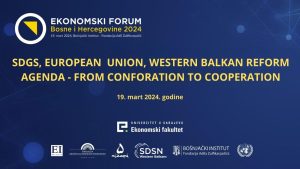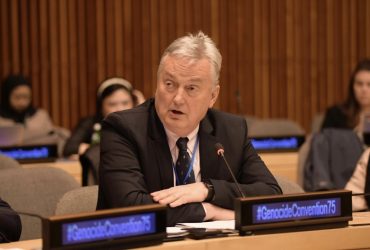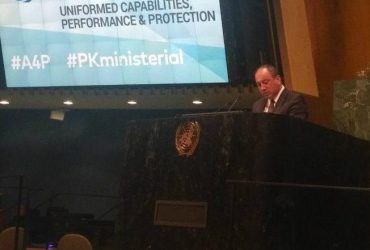Eighth Economic Forum of Bosnia and Herzegovina Kicks Off in Sarajevo: Promoting Sustainable Development Goals and Regional Cooperation

Today, amidst the picturesque streets of Sarajevo, the Faculty of Economics at the University of Sarajevo proudly launches the eighth edition of the Economic Forum of Bosnia and Herzegovina. This annual event stands as a beacon of economic discourse and strategic collaboration, bringing together policymakers, academics, and industry leaders to chart a course for sustainable development and economic prosperity in the region.
At the forefront of this year’s forum is a deep dive into the transformative potential of sustainable development goals (SDGs) in reshaping societies. With a keen eye on the unique challenges confronting both the region and its developing counterparts like Bosnia and Herzegovina and the broader Western Balkans, discussions are set to explore innovative solutions and collaborative frameworks aimed at fostering inclusive growth and resilience.
 Themed “SDGs, EU, WB Reform Agenda 2030 – from confrontation to cooperation,” the forum sets a robust agenda, encapsulating diverse perspectives and actionable insights across two distinct sessions: “Economy” and “Green Transition.” Steering the dialogue forward is the H.E. dr Zlatko Lagumdžija, Bosnia and Herzegovina’s Permanent Representative to the UN, whose wealth of academic knowledge and diplomatic experience promises to enrich the discourse with strategic foresight and pragmatic solutions.
Themed “SDGs, EU, WB Reform Agenda 2030 – from confrontation to cooperation,” the forum sets a robust agenda, encapsulating diverse perspectives and actionable insights across two distinct sessions: “Economy” and “Green Transition.” Steering the dialogue forward is the H.E. dr Zlatko Lagumdžija, Bosnia and Herzegovina’s Permanent Representative to the UN, whose wealth of academic knowledge and diplomatic experience promises to enrich the discourse with strategic foresight and pragmatic solutions.
In her opening remarks, Dean Meliha Bašić underscored the forum’s forward-looking approach, emphasizing the imperative of addressing pressing issues relevant to Bosnia and Herzegovina’s economic trajectory. Bašić emphasized the urgent need for a green transition, not only as a local imperative but as a global necessity recognized by entities like the European Union. She called for robust participation from all sectors of society, stressing the importance of collaboration between academia, industry, and government in driving meaningful change.

Echoing these sentiments, Minister of Foreign Affairs Elmedin Konaković underscored the inseparable link between political stability and economic prosperity. Drawing attention to Bosnia and Herzegovina’s high export dependency – with a staggering 93% of products shipped annually – Konaković highlighted the critical role of integration into the European market. He emphasized the imperative of addressing political instabilities to unlock the country’s full economic potential, calling for a united front in tackling pressing challenges.
“This topic should dominate the public scene in Bosnia and Herzegovina, but often it does not. Discussions like today’s should navigate the paths of Bosnia and Herzegovina, and if economic analysts were louder than politicians, we would have a brighter future,” said the Minister of Foreign Affairs of Bosnia and Herzegovina, Elmedin Konaković.
Mayor of Sarajevo, Benjamina Karić emphasized the pressing need for a paradigm shift towards sustainable development. Drawing on Sarajevo’s rich cultural heritage and vibrant energy, Karić called for modernization of infrastructure and enhanced energy efficiency to propel the region towards a greener, more prosperous future. She rallied attendees to leverage the forum as a catalyst for collaboration, urging stakeholders to build bridges towards a shared vision of progress and prosperity.
Dr. Zlatko Lagumdzija delivered a keynote at the Sarajevo Economic Forum, highlighting the significance of the UN “Group of Friends SDG – European Union, Western Balkan Agenda 2030.” He stressed the need for inclusive cooperation and pressure on decision-makers to achieve sustainable development goals, emphasizing the parallel initiatives under the Berlin Process. Lagumdzija shared insights on the uneven progress in SDG achievement and the global economic outlook, advocating for cooperation to mitigate risks. Specifically focusing on the Western Balkans, he outlined pathways for integration with the EU, emphasizing the importance of joint initiatives in areas such as the economy, green transition, health, and digital transformation to foster sustainable development and economic growth.



